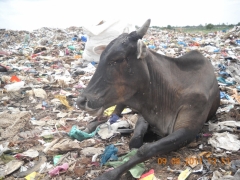It is easy to sing the praises of our
righteousness, yet sitting with our bad choices, or even worse, broadcasting
them, a down right terror. Though the first sentences of my last post were
correct, they were quite misleading. Truth be told, I rarely find myself in a
place where I am cooking for myself in the way that I stated. I am often a
slave to the quick and convenient. Whether it fast-food or single serve,
high-waste meals from the grocery store, or worse yet, convenient store, I find
that I am not properly addressing how my body is effected by this disposable
lifestyle, let alone how much the earth is harmed on many levels.
 |
| http://www.fastcoexist.com/1680494/the-environmental-impact-of-wasted-food |
To answer the question, " Is my meal a problem, (that meal)?" No, or at least not as much as the real problem of how I consume. While there is an obvious issue with large-scale animal farming and how the earth is affected by it, the smaller farms that make up Niman Ranches are far less wasteful. It is great that Outpost works with local purveyors to help its community consumer more intelligently. Finally, while I have issue with some of the high-end natural food excessive packaging, most of the materials are recycled and often made of alternative to petroleum, like corn-based plastics. The benefits of buying local provide you the shortest route to the products that one desires. It is this short path that is reminiscent to a day that has passed by many, where all were more connected to the labor that got them their consumables. Whether you grew crops, or sewed your clothes, there was more of a connection to the items we use on a daily basis. All natural, locally sourced friendly environments, combined with a strong do-it-yourself (D.I.Y.) mentality has drastically shifted the conscious of many consumers, or so it seems. While my extremes of strict locally sourced dinners along with McDonald’s are quite a drastic parody, many fall in line between the two. It is with this awareness of ones consumption that can help to change how all of us make decisions on what we buy.
On the global level, the United States can use their buying power to help provide incentives to foreign and domestic companies that use environmental progressive forms of agriculture and industry. Using companies that provide adequate care for their employees also will help to shape how countries around the world interact with one another. It is only after a proper dialog about how to treat one another can we get past the damage that we are doing to one another and the earth. Since so much is based on profit, this might take a very long-term plan in order to accomplish humanitarian and environmental goals.
The local level is where so much action has to happen. We need more
public gardens, more farmers markets and more green workshops. These are all
ways to teach people the importance of what they choose to put in their body.
While this solution seems easy, there are complex issues of privilege and
unequal sources to services within communities. This is especially evident in
education surround these topics.
Simply put, we need to truly love ourselves and know we are worth the
investment in time, our food, our homes, and one another. It might sound
cliché, but until we value one another and ourselves and are more connected in
a “real,” non-social media type way; it
is hard for a drastic change. Progress keeps happening. We need to occasionally
take a look at where we are at, and ask ourselves, “Is this progress?’

